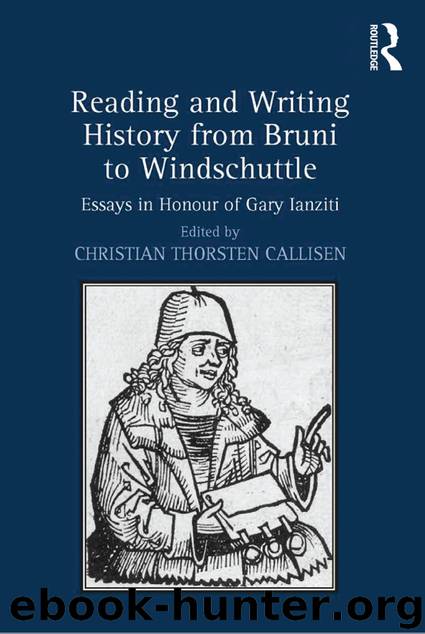Reading and Writing History From Bruni to Windschuttle: Essays in Honour of Gary Ianziti by Christian Thorsten Callisen

Author:Christian Thorsten Callisen
Language: eng
Format: azw3, mobi, epub
ISBN: 1409457052
Publisher: Ashgate
Published: 2014-06-27T21:00:00+00:00
Chapter 7
The Uses of Natural Law in Early
Modern Germany: Christian Thomasius’s
Reshaping of the Legal Persona
Ian Hunter
Introduction
In his comprehensive and illuminating reconstruction of the historical writing of Leonardo Bruni, Gary Ianziti has argued that Bruni should be regarded neither as a late-medieval chronicler nor as a modern critical historian. In excavating the models and methods of history writing employed by Bruni, and the political context and purposes for which he employed them, Ianziti offers a masterclass in avoiding anachronistic misreading. He thus provides a richly nuanced account of Bruni as an historian who placed classical models of history writing at the service of the political elite of an emerging territorial state, while simultaneously transforming these models through the use of philological methods and the introduction of secular conceptions of historical time and causation.1 In what follows I shall attempt to follow Ianziti’s example by discussing what it would mean to provide a non-anachronistic account of the natural law of Christian Thomasius (1655–1728), although my account will be quite modest in comparison.
The obstacles blocking the path to a contextual historical account of Thomasius’s natural law are the result of his modern reception, which began in postwar Germany. This reception took place at the confluence of two historical currents. First, Thomasius’s natural law was approached in post-Kantian terms as if it were a moral philosophy attempting to provide a universal theoretical basis for the exercise of juridical and political authority. Second, this retrieval was informed by the German academy’s recoil from the moral catastrophe of the Nazi period and its desire to reach back in German history for untainted defences of liberal rights and freedoms.2 Thomasius was thus approached as if he were a modern academic moral philosopher, writing natural law works in order to provide universal normative grounds for justice – of the sort provided by Aristotelian virtue ethics or Kantian philosophy of right – and taking important steps towards a liberal political order, through his separation of law from morality and his defence of religious freedom.3 Those commentators who did take note of the fact that Thomasius actually viewed law as the command of an absolute sovereign could then proceed to blame him for failing to live up to the liberal ideal that he had been saddled with. Their argument was that Thomasius had failed to reconcile ‘norms and facts’, or ‘theory and practice’, and that his separation of law from morality was a sign that he had failed to complete the transition to a liberal modernity.4
If we are to avoid this anachronistic treatment of Thomasius’s natural law writings then we must investigate not only their shifting intellectual constituents – church law, public law, ethical exercises, political doctrines – but also the cultural and political context in which Thomasius assembled (and reassembled) these elements, and the purposes for which he did so. The picture that begins to emerge from these investigations is not that of a moral philosopher seeking universal normative foundations for liberal law and politics; rather it is that
Download
Reading and Writing History From Bruni to Windschuttle: Essays in Honour of Gary Ianziti by Christian Thorsten Callisen.mobi
Reading and Writing History From Bruni to Windschuttle: Essays in Honour of Gary Ianziti by Christian Thorsten Callisen.epub
This site does not store any files on its server. We only index and link to content provided by other sites. Please contact the content providers to delete copyright contents if any and email us, we'll remove relevant links or contents immediately.
| Ancient & Classical | Arthurian Romance |
| Beat Generation | Feminist |
| Gothic & Romantic | LGBT |
| Medieval | Modern |
| Modernism | Postmodernism |
| Renaissance | Shakespeare |
| Surrealism | Victorian |
4 3 2 1: A Novel by Paul Auster(11746)
The handmaid's tale by Margaret Atwood(7410)
Giovanni's Room by James Baldwin(6754)
Asking the Right Questions: A Guide to Critical Thinking by M. Neil Browne & Stuart M. Keeley(5322)
Big Magic: Creative Living Beyond Fear by Elizabeth Gilbert(5307)
Ego Is the Enemy by Ryan Holiday(4895)
On Writing A Memoir of the Craft by Stephen King(4640)
The Body: A Guide for Occupants by Bill Bryson(4542)
Ken Follett - World without end by Ken Follett(4415)
Bluets by Maggie Nelson(4229)
Adulting by Kelly Williams Brown(4200)
Eat That Frog! by Brian Tracy(4105)
Guilty Pleasures by Laurell K Hamilton(4089)
White Noise - A Novel by Don DeLillo(3807)
The Poetry of Pablo Neruda by Pablo Neruda(3784)
Fingerprints of the Gods by Graham Hancock(3710)
Alive: The Story of the Andes Survivors by Piers Paul Read(3706)
The Book of Joy by Dalai Lama(3652)
The Bookshop by Penelope Fitzgerald(3597)
